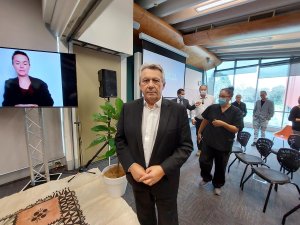Respiratory physician Lutz Beckert considers chronic obstructive pulmonary disease management, including the prevention of COPD, the importance of smoking cessation and pulmonary rehabilitation, and the lifesaving potential of addressing treatable traits. He also discusses the logic of inhaler therapy, moving from single therapy to dual and triple therapy when indicated, as well as other aspects of management
Keeping the ‘public’ in public health policy – how you can help
Keeping the ‘public’ in public health policy – how you can help

Public health professionals face a dilemma when seeking to publicly voice their views on health policy, writes David Galler
It’s like funding the firefighters, while enabling the arsonists
Last month’s New Zealand Doctor Rata Aotearoa reported on changes under the new Te Whatu Ora – Health New Zealand that could undermine public health experts’ ability to provide advice to governments.
Te Whatu Ora district public health officials will have their submissions on sugar, alcohol and tobacco policies vetted nationally, Martin Johnston reported in the 31 August edition.
Health Coalition Aotearoa seeks to support strong independent advice from health professionals and NGOs that improves population health and makes health outcomes fairer for all.
Established in 2019, the coalition aims to improve population health by preventing harm from alcohol, tobacco and unhealthy food, and to strengthen public health infrastructure. One third of healthy life years in Aotearoa are lost to these three harmful products alone.
The coalition’s members work to ensure evidence informs policy on unhealthy products. We are an outlet for experts and health professionals who might otherwise get sidelined in discussions between governments, officials and lobbyists representing commercial interests.
As a doctor, recently retired after 32 years at Middlemore Hospital, there is nothing more depressing than seeing the same people day after day harmed by unhealthy products. How absurd that we allow this harm to continue for them, their whānau and our communities while pouring more and more public money into treating preventable disease. It’s like funding the firefighters, while enabling the arsonists; and how thoughtless to put so much pressure on a workforce already stretched to the maximum.
Whatever care we provide, as soon as our patients are discharged, they walk straight back into the same environment where access is easy to heavily marketed unhealthy foods and alcohol; onto the same transport system dominated by private cars; and into jobs with the same incomes. Only by taking action to change these drivers of health can we really protect patients.
These unhealthy environments in our neighbourhoods are largely determined by corporate interests that are most dangerous to those already disadvantaged.
Many pro-health policies have been advocated that would protect our economy, health system and the lives of all New Zealanders, including the working lives of health professionals. But New Zealand politicians don’t have much of a historical appetite for pro-health policy.
Back in the 2000s, the Public Health Advisory Committee gave independent advice to health ministers. The committee produced a series of pesky public reports like the Advice on Obesity Inquiry, which highlighted how far out of step Government policy was with prevention.
In 2016, health minister Jonathan Coleman quietly “streamlined” the committee into the Ministry of Health, where it sank into oblivion.
The Pae Ora (Healthy Futures) Act 2022 – the law underpinning the health reform – brings the committee back into action as the Public Health Agency, although no appointees have yet been announced.
However, other advisors inside the new system are having their independence and ability to speak out seriously curbed.
For example, prior to the reforms starting 1 July, the then Te Hiringa Hauora – Health Promotion Agency provided independent advice to the Government on alcohol policy and legally could not be directed by a minister in that area.
This agency and many of its staff have been absorbed into Te Whatu Ora – Health New Zealand under the new National Public Health Service. They lack their previous Crown Entities Act 2004 exemption from ministerial direction. In our submission on the pae ora legislation, Health Coalition Aotearoa asked for the exemption to continue.
The coalition also suggested Te Whatu Ora and Te Aka Whai Ora – Māori Health Authority be empowered to require public health impact assessments on policies outside of healthcare, independently of the minister. In the end, the act did not grant these new entities such powers.
Health Coalition Aotearoa recommended creating regional structures for community engagement to counter the loss of DHBs, something similar to Iwi Māori Partnership Boards in the pae ora legislation. Unfortunately, as reported in New Zealand Doctor, the public and community sections of DHB Board meetings haven’t yet been replaced.
Official advice to ministers can be requested under the labyrinthine Official Information Act 1982 – but regional health experts using this won’t be able to contribute to a timely public conversation.
If public services aren’t primarily accountable to the public, who are they serving?
You can only imagine the pressure on officials if professional advice doesn’t align with official policy. Especially during election years when health reforms are a political hot potato.
Enter NGOs, to provide an important check and balance on the Government and fill the public policy advice vacuum that the reforms put at risk.
Health Coalition Aotearoa members include health-sector unions the Association of Salaried Medical Specialists Toi Mata Hauora and the Public Service Association Te Pūkenga Here Tikanga Mahi.
Unions provide clear guidance and protect public employees’ right to be involved in matters of public interest.
For example, ASMS, whose members include medical officers of health, has a collective agreement provision noting “the employer respects and recognises the right of its employees to comment publicly and engage in public debate on matters relevant to their professional expertise and experience”. If eligible, consider joining your union and using those clauses as a powerful way to protect your rights.
This right to vocalise valuable expertise is also supported by several public-health specific NGOs. The Public Health Association publicises submissions and position statements on issues like climate change and institutional racism and welcomes participation from health professionals.
The Health Promotion Forum is the umbrella organisation for those working in health promotion and provides professional training.
Health Coalition Aotearoa’s focus is evidence-based policy, research, communication and collective action around harmful products. Membership is open to all those without commercial conflicts. All three organisations amplify the voice of members for better public health and health equity.
Remaining fully independent is a struggle. The coalition’s precursor, Activity and Nutrition Aotearoa, tells a cautionary tale. It became trapped between the need for secure baseline funding and conditional clauses in Government grants. The financial demise of the NZMA is another blow to independent advocacy in a difficult economy.
Because of the coalition’s staunch evidence-based stance, secure funding is a challenge for us. We are reliant on donations from members to remain independent. We need to raise an additional $50,000 by March 2023 to continue our mahi.
A handful of regular donors contribute a portion of their income, or in the case of “preventioners” their superannuation, to keep us afloat.
We welcome discussions with any health professionals who can contribute via membership and regular donations of any size with our board co-chairs, Boyd Swinburn and Lisa Te Morenga.
Please consider joining us today or gifting a one-off online donation as a first step towards protecting public health. You can drop us a line to keep the conversation going via info@healthcoalition.org.nz
We’ll be watching the health reforms carefully.
David Galler, a retired intensive care specialist and author of Things That Matter, is the permanent chair of the public health infrastructure expert panel of Health Coalition Aotearoa. Dr Galler is currently travelling overseas








![Barbara Fountain, editor of New Zealand Doctor Rata Aotearoa, and Paul Hutchison, GP and senior medical clinician at Tāmaki Health [Image: Simon Maude]](/sites/default/files/styles/thumbnail_cropped_100/public/2025-03/Barbara%20Fountain%2C%20editor%20of%20New%20Zealand%20Doctor%20Rata%20Aotearoa%2C%20and%20Paul%20Hutchison%2C%20GP%20and%20senior%20medical%20clinician%20at%20T%C4%81maki%20Health%20CR%20Simon%20Maude.jpg?itok=-HbQ1EYA)
![Lori Peters, NP and advanced health improvement practitioner at Mahitahi Hauora, and Jasper Nacilla, NP at The Terrace Medical Centre in Wellington [Image: Simon Maude]](/sites/default/files/styles/thumbnail_cropped_100/public/2025-03/2.%20Lori%20Peters%2C%20NP%20and%20advanced%20HIP%20at%20Mahitahi%20Hauora%2C%20and%20Jasper%20Nacilla%2C%20NP%20at%20The%20Terrace%20Medical%20Centre%20in%20Wellington%20CR%20Simon%20Maude.jpg?itok=sUfbsSF1)
![Ministry of Social Development health and disability coordinator Liz Williams, regional health advisors Mary Mojel and Larah Takarangi, and health and disability coordinators Rebecca Staunton and Myint Than Htut [Image: Simon Maude]](/sites/default/files/styles/thumbnail_cropped_100/public/2025-03/3.%20Ministry%20of%20Social%20Development%27s%20Liz%20Williams%2C%20Mary%20Mojel%2C%20Larah%20Takarangi%2C%20Rebecca%20Staunton%20and%20Myint%20Than%20Htut%20CR%20Simon%20Maude.jpg?itok=9ceOujzC)
![Locum GP Helen Fisher, with Te Kuiti Medical Centre NP Bridget Woodney [Image: Simon Maude]](/sites/default/files/styles/thumbnail_cropped_100/public/2025-03/4.%20Locum%20GP%20Helen%20Fisher%2C%20with%20Te%20Kuiti%20Medical%20Centre%20NP%20Bridget%20Woodney%20CR%20Simon%20Maude.jpg?itok=TJeODetm)
![Ruby Faulkner, GPEP2, with David Small, GPEP3 from The Doctors Greenmeadows in Napier [Image: Simon Maude]](/sites/default/files/styles/thumbnail_cropped_100/public/2025-03/5.%20Ruby%20Faulkner%2C%20GPEP2%2C%20with%20David%20Small%2C%20GPEP3%20from%20The%20Doctors%20Greenmeadows%20in%20Napier%20CR%20Simon%20Maude.jpg?itok=B0u4wsIs)
![Rochelle Langton and Libby Thomas, marketing advisors at the Medical Protection Society [Image: Simon Maude]](/sites/default/files/styles/thumbnail_cropped_100/public/2025-03/6.%20Rochelle%20Langton%20and%20Libby%20Thomas%2C%20marketing%20advisors%20at%20the%20Medical%20Protection%20Society%20CR%20Simon%20Maude.jpg?itok=r52_Cf74)
![Specialist GP Lucy Gibberd, medical advisor at MPS, and Zara Bolam, urgent-care specialist at The Nest Health Centre in Inglewood [Image: Simon Maude]](/sites/default/files/styles/thumbnail_cropped_100/public/2025-03/7.%20Specialist%20GP%20Lucy%20Gibberd%2C%20medical%20advisor%20at%20MPS%2C%20and%20Zara%20Bolam%2C%20urgent-care%20specialist%20at%20The%20Nest%20Health%20Centre%20in%20Inglewood%20CR%20Simon%20Maude.jpg?itok=z8eVoBU3)
![Olivia Blackmore and Trudee Sharp, NPs at Gore Health Centre, and Gaylene Hastie, NP at Queenstown Medical Centre [Image: Simon Maude]](/sites/default/files/styles/thumbnail_cropped_100/public/2025-03/8.%20Olivia%20Blackmore%20and%20Trudee%20Sharp%2C%20NPs%20at%20Gore%20Health%20Centre%2C%20and%20Gaylene%20Hastie%2C%20NP%20at%20Queenstown%20Medical%20Centre%20CR%20Simon%20Maude.jpg?itok=Z6u9d0XH)
![Mary Toloa, specialist GP at Porirua and Union Community Health Service in Wellington, Mara Coler, clinical pharmacist at Tū Ora Compass Health, and Bhavna Mistry, specialist GP at Porirua and Union Community Health Service [Image: Simon Maude]](/sites/default/files/styles/thumbnail_cropped_100/public/2025-03/9.%20Mary%20Toloa%2C%20Porirua%20and%20Union%20Community%20Health%20Service%20in%20Wellington%2C%20Mara%20Coler%2C%20T%C5%AB%20Ora%20Compass%20Health%2C%20and%20Bhavna%20Mistry%2C%20PUCHS%20CR%20Simon%20Maude.jpg?itok=kpChr0cc)